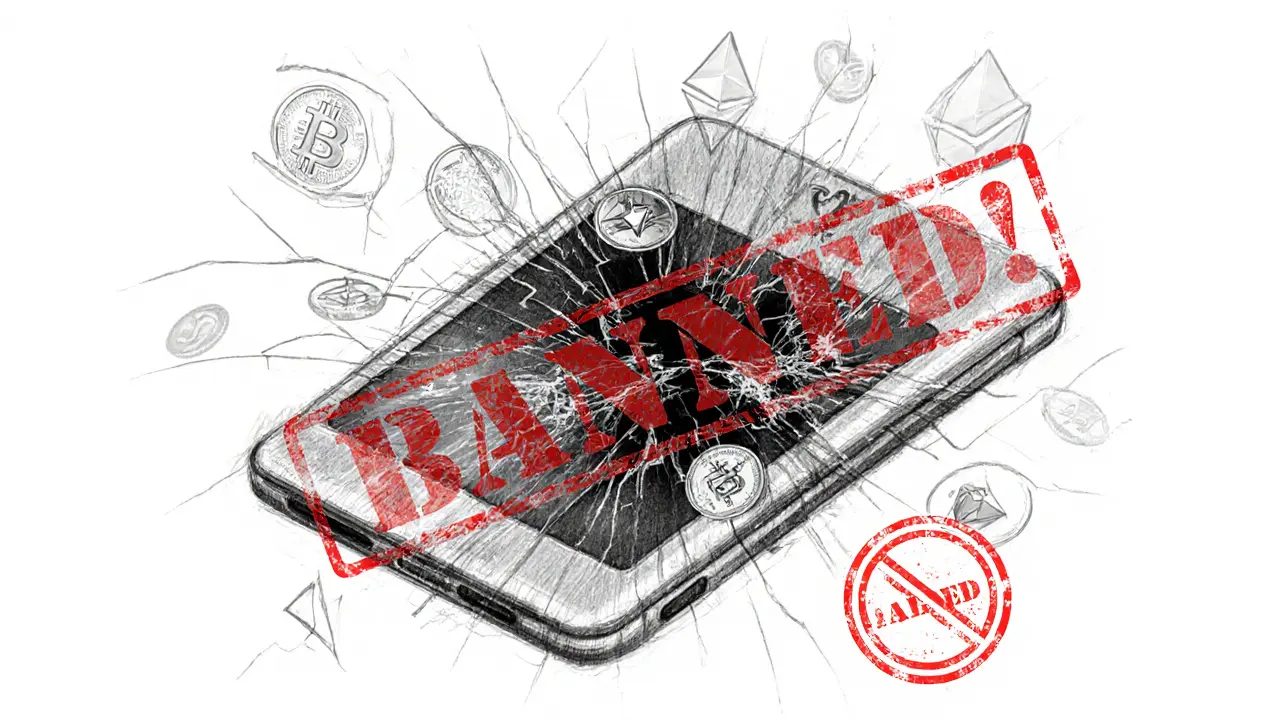China Cryptocurrency Legal Status Checker
Check if your cryptocurrency activity is legal in mainland China under the 2025 ban. This tool is based on Circular No. 237 and provides information on legal risks as of June 1, 2025.
Your Activity
Legal Status Results
As of June 1, 2025, owning, trading, or mining cryptocurrency in China is illegal. There are no exceptions. No gray areas. No loopholes. If you're in China - whether you're a citizen, a tourist, or a foreign worker - holding Bitcoin, Ethereum, or any other digital token breaks the law. This isn't a warning. It's the rule.
How China Went From Crypto Hub to Crypto Ban
In 2017, China was one of the biggest players in the global crypto market. It hosted over 70% of Bitcoin mining operations and was home to major exchanges like Binance and Huobi. But that changed fast. The People’s Bank of China banned initial coin offerings (ICOs) that year, calling them illegal fundraising. Then in 2021, it shut down all domestic cryptocurrency exchanges and banned financial institutions from handling crypto transactions.
By 2025, the government took the final step. Circular No. 237, issued on June 1, 2025, made every form of cryptocurrency activity illegal. That includes trading, mining, staking, lending, and even holding digital assets in personal wallets. It doesn’t matter if you bought Bitcoin in 2020 or mined Ethereum in your basement last year. If you still have it, you’re breaking the law.
What Exactly Is Banned?
The 2025 ban covers every possible activity involving cryptocurrency:
- Buying or selling crypto with yuan or foreign currency
- Operating or using cryptocurrency exchanges (even offshore ones accessed from China)
- Mining Bitcoin, Ethereum, or any other coin - including using home rigs or industrial farms
- Providing crypto price data, wallet services, or trading advice
- Accepting crypto as payment for goods or services
- Promoting crypto through social media, ads, or influencers
- Using decentralized finance (DeFi) platforms or NFT marketplaces
Even if you’re just holding crypto in a hardware wallet, you’re not protected. The government doesn’t criminalize private ownership outright - but it refuses to recognize it as legal property. If you lose your coins, get scammed, or have your wallet hacked, you have no legal recourse. Chinese courts won’t hear your case. They’ll say: “You were breaking the law by owning it in the first place.”
What Happens If You Get Caught?
Penalties aren’t just fines. They’re serious. Authorities treat crypto activity as illegal financial behavior. If you’re caught trading or mining, you could face:
- Account freezes and asset seizures (including bank accounts linked to crypto purchases)
- Fines up to 10 times the value of the crypto involved
- Criminal charges if authorities believe your activity resembles fraud or money laundering
- For foreigners: deportation or visa cancellation
In 2023, a Beijing resident was fined 800,000 yuan (about $110,000) for mining Bitcoin using 12 GPUs in his apartment. The machines were confiscated. His internet was cut. He was banned from opening new bank accounts for two years. That case became a warning to others.

Why Did China Do This?
China’s goal isn’t just to stop crypto. It’s to replace it.
The government has spent years building its own digital currency: the digital yuan, or e-CNY. Unlike Bitcoin, the e-CNY is fully controlled by the People’s Bank of China. Every transaction is tracked. Every user is verified. There’s no anonymity. No decentralization. Just state oversight.
Officials argue that private cryptocurrencies enable tax evasion, money laundering, and capital flight. They say crypto undermines financial stability. And they’re right - in their view. The state doesn’t want citizens moving money outside its control. It wants all transactions flowing through its system.
That’s why the government promotes blockchain - but only when it’s centralized. State-backed blockchain projects track supply chains, manage land registries, and verify identity documents. But any blockchain that removes control from the state? That’s banned.
What About Hong Kong?
Hong Kong is different. It’s part of China, but it operates under its own financial rules. In May 2025, Hong Kong passed the Stablecoin Bill, creating a licensing system for stablecoin issuers. Major exchanges like OKX and Bybit have moved key operations there. You can legally trade crypto in Hong Kong - as long as you’re not doing it from mainland China.
But here’s the catch: if you live in Shanghai and use a Hong Kong exchange from your phone, you’re still breaking Chinese law. The ban applies to anyone physically in mainland China. Location matters more than nationality.
Can You Still Use Crypto in China?
No - not legally. Even using a VPN to access Binance or Coinbase is risky. Authorities have improved their ability to detect and block crypto-related traffic. Banks now flag transfers to known crypto platforms. Mobile apps that offer crypto services are removed from Chinese app stores.
Some people still hold crypto privately. But they don’t talk about it. They don’t trade. They don’t mine. They just keep it offline, hoping it stays safe. But if authorities ever audit your bank records or phone data - and they will if they suspect financial crime - your crypto holdings become evidence of a crime.
What About Blockchain?
Blockchain is fine - if the state controls it.
China leads the world in blockchain patent filings. The government uses blockchain for digital ID, public records, and even voting trials in some cities. The Shanghai Data Exchange launched a data asset-backed financing instrument (RDA) in late 2024 - but it’s not crypto. It’s a government-controlled digital asset tied to real data, not decentralized tokens.
The message is clear: innovation is welcome, as long as it serves the state. Decentralization? That’s a threat.
What’s Next for Crypto in China?
Don’t expect a reversal. The ban is too deeply tied to China’s broader financial strategy. The e-CNY is being rolled out nationwide. By 2026, it will be mandatory for many public services. The government wants to eliminate cash and private digital currencies at the same time.
There’s no sign of easing. No court rulings have challenged the ban. No official has suggested lifting it. The crackdown on mining and trading has been total. Even offshore companies trying to market crypto to Chinese users are being blocked. The Chinese firewall now includes crypto filters.
The only possible exception? If China ever decides to issue its own crypto-like asset - but it won’t be decentralized. It’ll be another tool for control.
Final Reality Check
If you’re in China, crypto is not an investment. It’s a legal risk. No matter how much you believe in Bitcoin, Ethereum, or the idea of financial freedom - the law doesn’t care. Your digital wallet won’t protect you. Your VPN won’t save you. Your beliefs won’t matter.
The Chinese government has made its choice. It chose control over chaos. Centralization over decentralization. State power over private ownership.
There’s no middle ground. There’s no compromise. And as of 2025, there’s no legal way to own cryptocurrency in China.
Is it illegal to hold cryptocurrency in China?
Yes, holding cryptocurrency is not protected by law and is treated as an illegal financial activity under Circular No. 237. While the law doesn’t explicitly say “you will be jailed for owning Bitcoin,” any possession or use of crypto is considered part of an illegal financial system. Authorities can seize assets, freeze accounts, and impose fines. Courts will not help you recover lost funds because the underlying activity is illegal.
Can I mine cryptocurrency in China?
No. All cryptocurrency mining is banned nationwide. Any mining operation - whether industrial or home-based - is illegal. Authorities have shut down over 95% of mining facilities since 2021. In 2025, new laws increased penalties, including equipment confiscation and criminal charges for repeat offenders. Power companies are required to report unusual energy usage that matches mining patterns.
Can I use Binance or Coinbase from China?
No. Accessing foreign crypto exchanges from within mainland China is prohibited. These platforms are blocked by China’s internet firewall. Even using a VPN to access them can trigger monitoring by authorities. Banks now flag transactions to known crypto domains. If you’re caught, your accounts could be frozen, and you could face administrative penalties.
Is the digital yuan the same as cryptocurrency?
No. The digital yuan (e-CNY) is a central bank digital currency (CBDC) fully controlled by the People’s Bank of China. Every transaction is tracked, users are verified, and there’s no anonymity. Unlike Bitcoin or Ethereum, it’s not decentralized. It’s a digital version of cash - but with total state oversight. The government promotes e-CNY as the only legal digital money in China.
What happens if I send crypto to someone in China?
Sending crypto to someone in China is illegal under the 2025 ban. The recipient is violating the law by receiving it. Even if you’re outside China, you could be held responsible if authorities determine you knowingly facilitated an illegal financial transaction. The law applies to anyone involved in crypto activity that touches China, regardless of location.
Can I buy crypto with my Chinese bank account?
No. Chinese banks are legally required to block all transactions related to cryptocurrency. If you try to buy crypto using your bank account, the payment will be rejected. If you’ve done this in the past, your account may have been flagged. Banks now use AI systems to detect crypto-related transfers, and repeated attempts can lead to account suspension or investigation.
Is blockchain legal in China?
Yes - but only if it’s controlled by the state. China actively supports blockchain technology for government use, such as tracking supply chains, managing digital IDs, and securing public records. However, any blockchain that allows decentralization, anonymity, or private ownership of assets is banned. The government distinguishes between blockchain as a tool and cryptocurrency as a threat.
Are there any legal crypto exchanges in China?
No. All domestic cryptocurrency exchanges were shut down in 2021. No new ones have been licensed since. Foreign exchanges like Binance, Coinbase, or Kraken are blocked and cannot legally operate in mainland China. Even marketing crypto services to Chinese users from overseas is prohibited and subject to enforcement actions.

